Last week, I had the unreal honor of attending Nuclear Dialogue Africa: Regulatory Excellence and Communications, a three-day conference in Nairobi, Kenya, hosted by Wilton Park, the UK Foreign, Commonwealth and Development Office, and the U.S. Department of Energy. The event, held at the stately Windsor Golf Club north of the city, brought together nuclear regulators, civil society organizations, and energy experts from Africa, Europe, and North America to tackle the regulatory stalemate in nuclear energy and craft fresh strategies for governance and public engagement.
I settled into my seat early in the vast and weathered Oak Room, watching some of the heroes of the nuclear movement enter. First was Aleshia Duncan, aka “The Disruptor” from the U.S. Department of Energy, a maven of American foreign policy and civil nuclear development in Africa. We had met before, and I have always been amazed by her generosity in mentoring young people (myself included) and her incisive, action-oriented language.
Surrounding her were other young nuclear luminaries: Umar Farouk Ahmad from Nigeria, Queenter Osoro, Robert Kiptoo, and Peter Gichuki from Kenya, Bana Remy Wilson from Rwanda, Richard Ollington and Seb Brixton-Harris from the UK. And, of course, Princy Mthombeni from South Africa, founder of Africa4Nuclear. We had met before in Berlin, New York, and Dubai. Princy took her seat next to me, and the day began in earnest.
Big Trouble on Little Earth
After a welcome from Wilton Park leadership, we locked in for the first panel—an array of veteran nuclear regulators speaking on the importance of their work. As the discussion unfolded, I was dismayed to sense a chasm widening between the seasoned rule-makers and the young luminaries. The lush red carpet at the center of the room had transformed into molten lava. My focus blurred at every mention of “safeguards” and other radiophobic buzzwords.
Years of stagnation in the nuclear industry have left regulators bookish and isolated, often pantomiming nuclear fear as an act of self-preservation. Without a steady cadence of new nuclear builds, regulators have spent decades calcifying outdated conventions rather than actively shaping a growing industry. Hearing veterans speak of 40-year careers preparing for projects that have yet to materialize felt like senseless martyrdom.
Meanwhile, nuclear activists have become emboldened by the global resurgence of fission. We are anxious to build actual plants, not just discuss them for the rest of our careers. While our movement is rooted in optimism, there is also frustration toward the forces delaying this abundant energy future. One common scapegoat? The regulators themselves—enforcing rules that inhibit progress, perhaps even serving anti-nuclear forces with their impossible processes and lack of public advocacy.
I regained focus, poured myself a glass of water to combat the Kenyan altitude, and tried to the pit of lava bubbled furiously before us.
American Smuggery
Despite deep breaths and a whole pitcher of water, I became angry. How could any democratic country rise and build this essential technology given the crushing pessimism of our own regulators? Of course, I was projecting my frustration with the lack of new builds in the U.S. and the persistent narrative that the Nuclear Regulatory Commission (NRC) is a bottleneck to progress. Notably, no NRC representatives were at the event, adding to my frustration.
During Q&A, I activated my microphone and made the following statement:
“With the passage of the ADVANCE Act in the United States Congress by an overwhelming bipartisan majority last year, our NRC must now update its mission to ensure that licensing and regulation of nuclear energy are efficient, without unnecessary limitations on deployment. This reflects a recognition that regulatory delays are a danger to public welfare. Do you expect your own national regulators to follow this trend? After all, the most dangerous nuclear power plant is the one that is never built.”
Heart pounding, I felt brash. More questions were fielded, but ultimately, the panelists chose not to answer mine. Still, a smugness came over me. I had raised the pirate flag of faster, cheaper nuclear and caught the eyes of the top regulators from Kenya and Finland.
Success over Fear
On Day 2, the activists had our chance to present. Richard Ollington shared Public Attitudes Towards Clean Energy 2023, showcasing a novel polling technique measuring nuclear support. Princy then took the mic, detailing how major NGOs have excluded her from events for being pro-nuclear—comparing it to colonization and earning the only unprompted applause of the conference. Peter spoke about his advocacy work in Kenya with WePlanet.
Then it was my turn. Written on the plane ride over, I spoke about the “vibe shift” in nuclear communication, the need to imbue our language with goodness to dispel nuclear fear, and the importance of tangible public benefit. I urged the room to engage art and culture earnestly, call in policymakers with terse whitepapers, and sweat now to earn the respect of the young people who will build and enjoy this high-energy future.
In my conclusion, I spoke directly to the regulators in the room: design a framework for success, not fear. Referencing Ollington’s polling data, I challenged the group to recognize that public sentiment has tipped. Nuclear is the next big thing, and we must craft a streamlined framework that removes ancient limitations, ensuring regulatory efficiency that promotes nuclear deployment at the speed and scale necessary to save humanity and the ecosystems that surround us.
Brokenness
After my speech, a crash of ego and jetlag consumed me. I excused myself to lie down and awoke in darkness, realizing I had slept through the final session. Disoriented and embarrassed, I cringed at the nature of my speech. Had I really just told the world’s leading nuclear regulators to remove their claws? Had I brought American arrogance to a room full of good-faith actors on a continent striving for greatness? In that moment, I felt like any other ego-driven American, drunk in a bar, preaching hypocrisy to the world, helping no one. What a fool.
Redemption
On Day 3, in the hallways between sessions, I spoke with the head nuclear regulator of a major African country. He was dressed in a crisp linen shirt, white on one side, blue on the other, with gleaming chrome buttons. He asked how I was doing. I admitted my frustration.
Without hesitation, he said:
“Well, of course, you need to help yourself, and you needn’t worry about the rest of us as you find your own way.”
And he smiled. And a silence settled between us. And the world stood still. And I was a child before him, gasping for breath between the sobbings of my soul. And I felt the cloud of my own anger dispel in his warmth. And I felt the weight of my own expectations evaporate. And my perception shifted in a forever sort of way.
Now what?
As I sit on the rooftop of my hotel in Nairobi, waiting for my flight to Rwanda, I gaze at six high-rises under construction—a city awash with momentum, grit, and agency. In this moment, I reflect on how my fading degrowth mindset, once so dear to me, now feels dusty in the light of energy realism and human progress.
Every country is moving confidently toward a high-energy future. Only in the West do we cling to performative climate concern, wrapped in neo-colonialism and energy blindness. Abundance is in.
And when it all feels like too much, remember:
“Help yourself.”




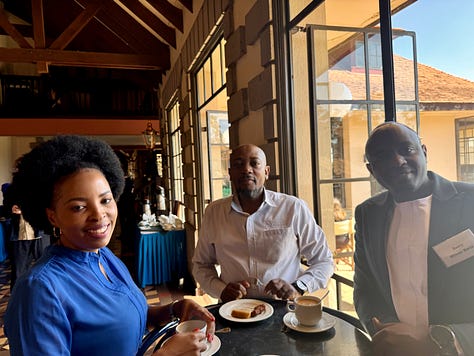
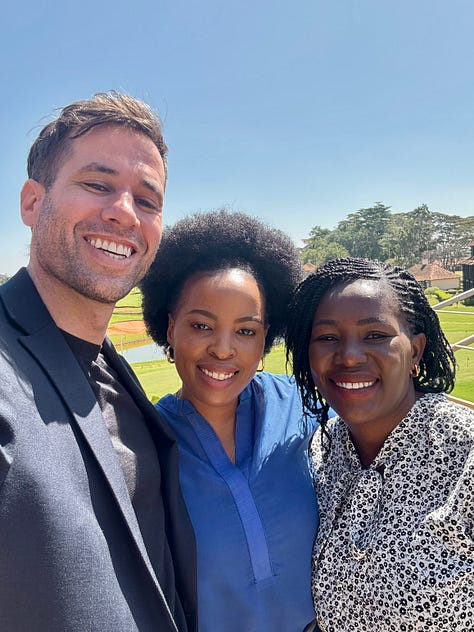
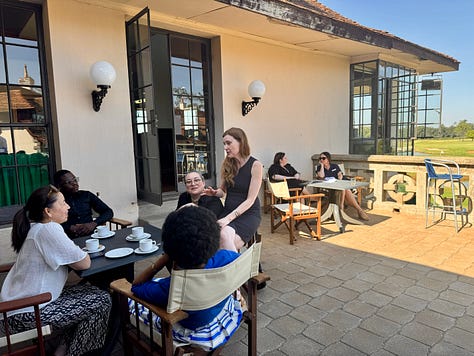

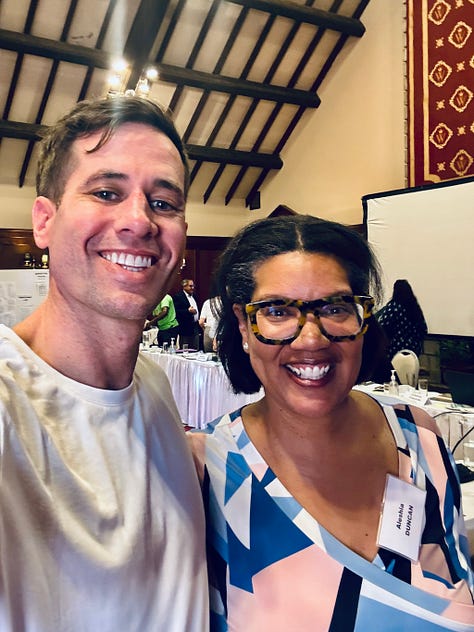

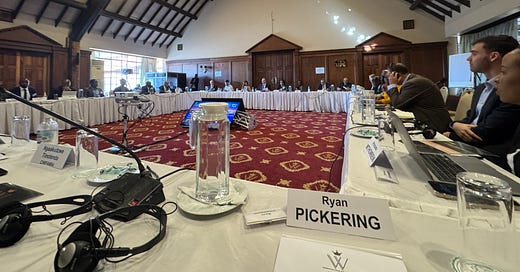




Those NGO’s that dog Princess Mthombeni have crippled nuclear energy deployment across the globe and are Malthusian idiots. You were most likely witnessing the fruits of their dark funding. The pronuclear community along with basic physics will ultimately rule the day, you can feel the tipping point, as you point out. Sometimes you just have to confront the assholes and take down their house of cards. Not everyone has humanity’s best interest at heart. You did good, well said. Bravo!
Your question may not have been answered but I have "the most dangerous nuclear power plant is the one that is never built" written down in my notebook. A memorable line that I look forward to using at the next opportunity